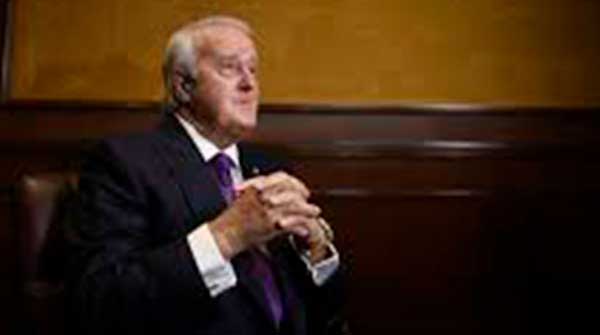His opposition to antisemitism, support of Israel and enduring relationship with Canadian Jews has never wavered
 I’ve been fortunate enough to know two Canadian Prime Ministers, Brian Mulroney and Stephen Harper. While they’re both ensconced on the right of the political spectrum, they obviously have certain ideological differences.
I’ve been fortunate enough to know two Canadian Prime Ministers, Brian Mulroney and Stephen Harper. While they’re both ensconced on the right of the political spectrum, they obviously have certain ideological differences.
But two notable and exemplary traits they do share are their strong support for Israel and their opposition to the scourge of antisemitism.
Neither held these positions to curry political favour or win votes. These are personal views they’ve held their entire lives, and they’ve never wavered or changed their tunes. Both men spoke out publicly because they felt it was right and just to do so.
Harper was Prime Minister from 2006 to 2015, so people today can still recall his views quite vividly. Mulroney, however, stepped down in 1993, meaning some Canadians are too young to remember – and others have forgotten over time.
 |
| Related Stories |
| A neo-Nazi taunts Jews in Nova Scotia, with government help
|
| Zundel’s foul legacy of persistent, organized hatred
|
| Standing firm against a rising tide of anti-Semitism
|
Fortunately, a recent policy paper highlights Mulroney’s fierce opposition to antisemitism, strong support of Israel and enduring relationship with Canadian Jews.
Donald E. Abelson and Monda Halpern’s On the Right Side of History: Brian Mulroney’s Enduring Battle Against Antisemitism, published by the Brian Mulroney Institute of Government at St. Francis Xavier University, is a fascinating, in-depth examination of these important topics and others. (My thanks to Mulroney and his executive assistant, Wakou Ngambany, for sending this paper.)
While some critics will undoubtedly mock the subject and source of this study, they shouldn’t. It’s a well-written paper by two university professors examining Canadian politics, history and Mulroney’s views and leadership from primary materials and with proper analysis.
“Mulroney has keenly recognized that despite collective post-Holocaust remorse and decades of Jewish upward mobility and acceptance in Canada,” the authors wrote, “complacency about the status and welfare of Jews is a luxury that Canadians can ill-afford.”
Mulroney was born in Baie-Comeau, Quebec, “a small pulp and paper mill town that had no Jews.” (It’s a remarkably different set of circumstances from Harper, who grew up in Toronto and had Jewish friends.) His first encounter with a Jewish person, the “son of a local clothier,” didn’t occur until he went to St. Thomas High School in Chatham, New Brunswick.
What led him to become a tour de force when it came to standing up for Canadian Jews and opposing antisemitism?
Abelson and Halpern’s paper showcased three factors: “ … his exposure to social justice issues while a student at St. Francis Xavier University (StFX), his years in Montreal in the 1960s, and his intense appreciation for the lessons of the past, which inspired his consistent resolve to be ‘on the right side of history.’”
Mulroney was disheartened at the hostility against Jews while growing up, whether he read or heard about it, or witnessed it first-hand in Quebec. He was determined to change perceptions about Jews in Canada when he became Prime Minister.
“With Jews representing less than two percent of Canada’s electorate, Mulroney had little to gain politically by garnering favour with the Jewish community,” the authors correctly note. Rather, he was “fulfilling an ethical imperative – pushing for Jews in federal politics and diplomatic posts, establishing the Deschênes Commission, and supporting the existence and self-preservation of Israel.”
Three of his chiefs of staff were Jewish – Stanley Hartt, Norman Spector and Hugh Segal. That’s even more impressive when you consider no previous Prime Minister, Conservative or Liberal, had ever hired a Jew to fill this role.
He would eventually appoint Spector as Canada’s first Jewish Ambassador to Israel. Liberal Senator David Croll, who Mulroney believed was consistently passed over for a cabinet position “for no apparent reason at the time other than his Jewishness,” was appointed to the Queen’s Privy Council. He also named former Ontario NDP leader Stephen Lewis as Canadian ambassador to the United Nations and Conservative Mira Spivak as the country’s first Jewish female Senator.
He initiated the Deschênes Commission of Inquiry on Nazi War Criminals in 1985. It was an unexpected announcement as Canadian Jewish leaders and groups reportedly hadn’t pushed or lobbied for it. Nevertheless, he believed in this commission and felt “the government should proceed with this major initiative because it was simply the right thing to do for the Holocaust survivors, for the dignity of the Jewish community, and for the honour of Canada.”
Abelson and Halpern point out he “frequently pledged” that Canadian foreign policy in the Middle East would ensure Canada makes “an ‘unshakable commitment’ to the integrity and well-being of Israel.” While opposition within his own cabinet, most notably Secretary of State for External Affairs Joe Clark, led to some frustration, he unequivocally believed Israel was a “legitimate and independent state” and “for very important historical reasons, Israel is, of course, better qualified than most to make determinations about its own well-being.”
Mulroney also “looked to the lessons of the Holocaust as inspiration for helping to redress other injustices,” including his powerful stance and important international role in opposing South African apartheid.
He continues to oppose antisemitism as a private citizen just as strongly as he did as a public official.
These are some reasons why Mulroney was determined to be on the right side of history.
Michael Taube, a Troy Media syndicated columnist and political commentator, was a speechwriter for former Prime Minister Stephen Harper. He holds a master’s degree in comparative politics from the London School of Economics.
For interview requests, click here.
The opinions expressed by our columnists and contributors are theirs alone and do not inherently or expressly reflect the views of our publication.
© Troy Media
Troy Media is an editorial content provider to media outlets and its own hosted community news outlets across Canada.


It is quite untrue to claim that the Jewish Canadian community did not lobby for the creation of the Commission of Inquiry on War Criminals, headed by the (late) Justice Jules Deschenes. It most certainly did, over several years, as I personally witnessed. We now know, of course, that the KGB provoked discord between the Jewish and Ukrainian (and other east European) communities over the alleged presence of “thousands” of “Nazi war criminals” supposedly hiding in Canada. That was known as “Operation Payback.” Deschenes eventually concluded that the whole issue had been “grossly exaggerated” by proponents of the claim that there were “thousands” of “Nazis” hiding in Canada, but it was too late – the damage was done.